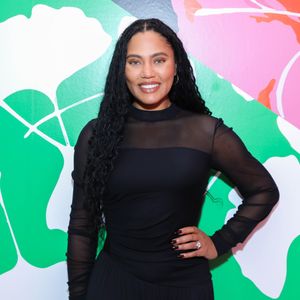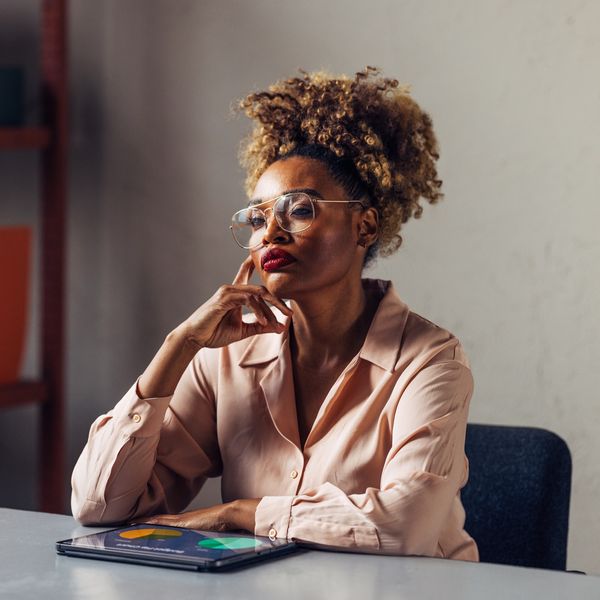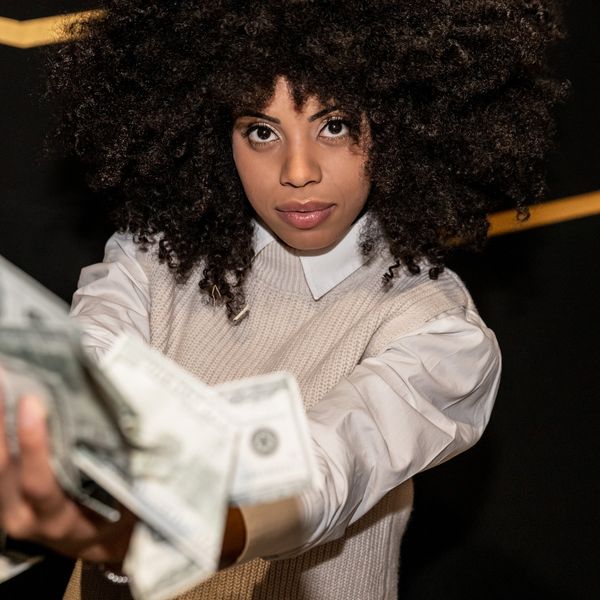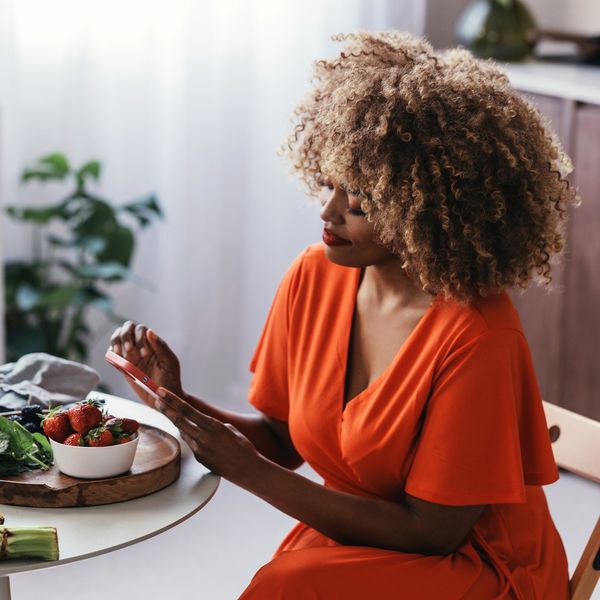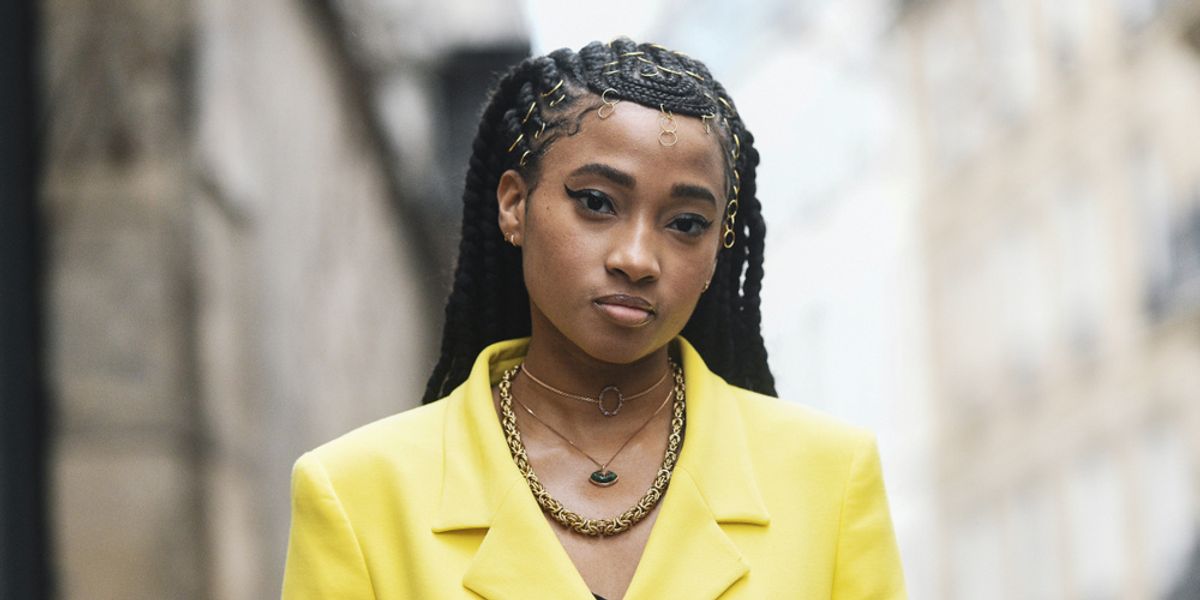
These Black Creatives Are Teaching Us How To Take Up Space
Living as a young black woman can sometimes seem like I am a walking threat. I am automatically "too much" for most when I walk into a room before I even speak a word. My existence alone is seen as intimidating. With all of that weight on my shoulders, it makes it extremely hard to show up and even harder to take up space.
To take up space is to acknowledge and accept your right to be, to exist, to have an opinion, to speak up, to simply be a body no matter what that looks like. But how can I live in all of that when I am inundated with society's definition of who I am? It's not easy but the defining factor is your choice to just be. My mom always told me, "Never dim your light for others because it's shining in their eyes." She didn't know it but she was telling me to take up space.
To take up space to some degree also means that you make room for others; by letting your light shine you empower others to do the same. The creatives on this list have made themselves responsible for telling our stories while also building more tables and more seats for others.
Ebonee Davis, Model & Activist
This top model has chosen to use her platform to be an unapologetic black girl which is no small feat in fashion. Ebonee Davis is a strong believer that fashion artists and creatives are the literal embodiment of free speech and they have a responsibility to use it wisely. In her powerful essay for Harper's Bazaar, she revealed some raw details about her upbringing. Being raised by drug addicts was one of the toughest things she had to overcome:
"Seeing my parents struggle pushed me to live beyond the status quo. Instead of living out my life as a product of my environment, I decided it was my job to break the chains of poverty, addiction and abuse; to rewrite my family history and live according to my own narrative. When I look back on my time in fashion, I realize that if it were not for my mistreatment as a Black model, I would not have the platform to inspire other young women of color to be their authentic selves, and to love themselves despite living in a society that constantly reaffirms our inadequacy."
When you see Ebonee on any red carpet or prime time event, she is representing the culture in ways little black girls must see. She had a wake up call in 2016 that catapulted her vision as a model. She started rocking her natural hair once she sat with herself and realized she had some subconscious beliefs tied to eurocentric beauty norms.
In a conversation with ESSENCE, she said:
"It just changed the way that I moved through spaces and now that I have access to spaces that aren't typically occupied by people who look like me, I feel like I have a duty to be outspoken. I am opening the door and I am leaving it open for people that are coming after me."
Kerby Jean-Raymond, Fashion Designer & Founder of Pyer Moss
Kerby Jean-Raymond founded the ultra-stylish and wildly woke brand, Pyer Moss, in 2013 as an art project. Little did he know that his art project would blossom into one of the biggest, most thought-provoking fashion houses in the game. With collections produced in New York, Italy and Portugal, Pyer Moss aims to use its voice and platform to challenge social narratives and evoke dialogue.
Noted for his "They Have Names" shirt featured on Colin Kaepernick, his "Stop Calling 911 on The Culture" design during the SS19 collection debuted at one of the country's first free black communities and every single moment during the SS20 collection at King's Theater this past September.
If you aren't hip to his magical designs and productions, then I am sure you may have recently seen his read on a major fashion publication. Business of Fashion has been naming 500 of the most innovative creatives for the past seven years and, this year, while the Haitian-American designer was a part of the list, he wasn't here for BoF's tomfoolery after a long list of hell nahs. Kerby took to Medium to pen a thoughtful yet truthful letter to the world.
My favorite excerpt:
"In short, fuck that list and fuck that publication. I take no ownership of choirs, Christianity or curating safe spaces for black people. That's a 'We' thing. Homage without empathy and representation is appropriation. Instead, explore your own culture, religion and origins. By replicating ours and excluding us — you prove to us that you see us as a trend. Like, we gonna die black, are you?"
Our boy could teach a whole class on taking up space because not only does he create spaces to tell our stories but he corrects those who frame it as such but only want to keep the culture as a fad.
Lindsey Peoples-Wagner, Editor-In-Chief of Teen Vogue
It's no secret I am obsessed with this human. Not many Editor-In-Chiefs have made it their business to show up for many underrepresented communities. At 29 years young, she is the youngest EIC at a major publication and that fact isn't lost on her as she continues to bring new and fresh perspectives to fashion.
Last year, we had the amazing opportunity to chop it up with her and she shared that she never thought that she would evolve from an assistant to an EIC. "I never thought it would happen but I'm so grateful that I am! I am really passionate about what I do, and I'm looking forward to using this platform to further conversations on inclusivity, diversity, and the future of fashion." Lindsay has always been a proponent of having larger conversations in fashion and not just focusing on trend reports.
In our exclusive interview she also shared, "I was always interested in fashion and beauty, but I think as a Black woman it just took time for me to really develop the lens in which I talk about those things. I've had a lot of conversations with mentors over the past couple years about who I want to be when I 'grow up', and I realized there were bits and pieces of a lot of different people and career paths that I wanted to mold into one, even if it didn't exist already."
Lindsay has always been open about what it means to have a seat at the table because it's more than pretty clothes. She believes that if you're at the fashion table, it's your obligation to move past the "gratitude" and move into the capacity to speak up and be the voice for those who have not yet made it to the table.
Melina Matsoukas, Visionary
Some call her the provocateur behind Beyoncé, Rihanna, and Issa Rae since she is responsible for some of our favorite visuals like "Formation", "We Found Love" and episodes of her hit show Insecure. Traditionally, Melina holds titles as a director of music videos and television shows. She began her journey snapping photos of her friends decked out in African garb. That led her to study film at New York University and cinematography in the graduate program at the American Film Institute. Her full circle moment happened this year when she was awarded the Franklin J. Schaffner Alumni Medal from AFI.
Most recently, with the talented Lena Waithe, she produced Queen & Slim, a film chronicling the journey of a black couple who go on the run after killing a police officer in self-defense. She told Variety.
"It's a story that I'm excited to tell because it challenges the idea of black love as well as the status quo. Lena and I hope that it sparks a dialogue and challenges people's views. I couldn't have made it through this process without Lena. On 'Master of None,' she trusted me with her personal story. Now I get to do this film with her — my soul sister."
As a creator, Melina finds power in documenting our stories in the most authentic ways. Most of all, her work is true to life. She never squanders an opportunity to bring light to injustices. For example, during the ELLE 2019 Women in Hollywood event, she dedicated her speech to Atatiana Jefferson by saying:
"I was up late last night trying to write my speech, trying to show my appreciation for the opportunities and the love and support I've been given."
"Trying to use my breath and my voice to create change and inspire on this stage today, but all I could think of were those whose breath was taken from us. All I could think of were my sisters who are not here, who could no longer speak, love, or thrive solely because of their existence as black woman. [Jefferson] was killed in her own bedroom, which is meant to be a safe haven for a person. She was murdered by someone meant to protect and to serve her. She was murdered because she was black."
Candace Marie, Social at Prada
She's the unapologetic black AF force behind Prada's social media and a constant street style killa. During an exclusive interview with us, she told us about her thoughts on inclusivity in fashion, "They can do way better. So much is hidden and deep-rooted that they don't realize what it is. I could be sitting in a board meeting and I question why am I the only black person out of 45 people that are here?"
She went on to say that she doesn't want to be the Bible for all things black but also realizes that there needs to be a shift and a change. "I honestly noticed it more as I started to travel and go to Fashion Weeks. You're not seeing any other women of color at the shows especially going into the luxury space. I remember a photographer told me he was shooting me because he wanted to make the street style some type of diverse. It's not their fault. Women of color are not being invited to these shows therefore you can't capture what's not there so it's like this domino effect."
That's why the Arkansas native pops out at international fashion weeks. To show up and take up space in her best cultured getups and hairstyles. She's leaving her foot print all over the fashion industry and we love that she's not afraid to be the first that looks like her to bring up topics and conversations outside of fabrics and designs.
Want more stories like this? Sign up for our newsletter here and check out the related reads below:
10 Female Photographers Putting On For The Culture
OlanikeeOsi Is The Bold, Fearless & Totally Unapologetic CEO Of The SelfishBabe App
10 Habits Of Successful Creatives
7 Unapologetic Women Share Their Personal Journey To Self-Love
Featured image by Creative Lab / Shutterstock.com
- Creative Commons: When we share, everyone wins ›
- 11 Black Visionaries Who Are Changing the Luxury Space Right Now ›
- Meet Ayoni, the Singer Creating Space for Black Creatives to be Weird ›
- The Success Of CultureCon Proves Black Creatives Got Next ... ›
- The iNCubator is Co-working for Black Creatives - Queen City Nerve ›
- Atlanta's newest space for Black creatives | The Atlanta Voice ›
- Goldn Roots: Black Creative Marketplace + Coworking Space ... ›
- Harlem's Hip Hop Film Festival Provides A Safe Space For Black ... ›
Joce Blake is a womanist who loves fashion, Beyonce and Hot Cheetos. The sophistiratchet enthusiast is based in Brooklyn, NY but has southern belle roots as she was born and raised in Memphis, TN. Keep up with her on Instagram @joce_blake and on Twitter @SaraJessicaBee.
ItGirl 100 Honors Black Women Who Create Culture & Put On For Their Cities
As they say, create the change you want to see in this world, besties. That’s why xoNecole linked up with Hyundai for the inaugural ItGirl 100 List, a celebration of 100 Genzennial women who aren’t afraid to pull up their own seats to the table. Across regions and industries, these women embody the essence of discovering self-value through purpose, honey! They're fierce, they’re ultra-creative, and we know they make their cities proud.
VIEW THE FULL ITGIRL 100 LIST HERE.
Don’t forget to also check out the ItGirl Directory, featuring 50 Black-woman-owned marketing and branding agencies, photographers and videographers, publicists, and more.
THE ITGIRL MEMO

I. An ItGirl puts on for her city and masters her self-worth through purpose.
II. An ItGirl celebrates all the things that make her unique.
III. An ItGirl empowers others to become the best versions of themselves.
IV. An ItGirl leads by example, inspiring others through her actions and integrity.
V. An ItGirl paves the way for authenticity and diversity in all aspects of life.
VI. An ItGirl uses the power of her voice to advocate for positive change in the world.
Let’s make things inbox official! Sign up for the xoNecole newsletter for daily love, wellness, career, and exclusive content delivered straight to your inbox.
These 11 Married Couples Share Their Keys To Long-Term Marital Success
The late actor Audrey Hepburn once said something that I think a lot of married couples who have at least 10 years under their belt will agree with: “If I get married, I want to be very married.” In my mind, this means very committed, very complementary, and very willing to go the distance — otherwise, what’s the point?
Really, what’s the point?
Thing is, with the divorce rate still being higher than it ever should be (for the record, a husband is not a boyfriend, and a wife is not a girlfriend; a marriage is serious business, y’all) and acting married being praised (or at least acknowledged) more than actually being married seems to be — folks who 1) are married and are looking for some hacks that will help with relational longevity or 2) want to be married someday and want insight on how to make their future marriage last are constantly seeking truly beneficial material.
Can you Google articles with random bullet points? Sure. And I’m not discouraging it. Every little bit of wisdom that you can pull, I fully support. However, the reason why I like to do articles like this one from time to time is there is something to be said from hearing real talk from multiple sources on the same topic who have some solid wisdom and knowledge on a particular topic.
Today? 11 married couples who were willing to talk about how they’ve been able to make it to several wedding anniversaries with a smile on their face and no regrets for choosing who they chose. Let’s all sit at their feet for just a moment.
*Middle names are always used in my content that’s like this so that people can speak freely*

Getty Images
1. Kyle and Adrienne. Married 12 Years.
Kyle: “Some of your readers aren’t going to want to hear this but it’s worked for my marriage: people need to lower their expectations sometimes; I mean, men and women. We go into marriage with stuff that movies told us, social media told us, friends who are always single told us about what we should expect from someone, and then want to fault the person when they’re not what we made up in our head. Everyone should have standards but if you’re expecting your spouse to be some living version of a fairy tale character, you’re going to be disappointed almost every day of your life. Drop those expectations some and watch your relationship be a lot less stressful.”
Adrienne: “Talk to people who respect your man about your marriage. I’ve never believed that you shouldn’t ever go to anyone when you need some support. Even the Bible says that there is safety in wise counsel [Proverbs 11:4]. Too many women talk to women who don’t respect men, in general, let alone their husbands, and so that’s where things go left. Sometimes, you need an ‘outside in’ perspective. But if that woman is always taking shots at men, doesn’t respect marriage, or isn’t someone who holds your man in high regard, don’t ask her for advice. Really, you should ask yourself why you’re friends with her at all.”
Shellie here: I’m big on engaged and married couples having a “village” of sorts for their relationship, too. Check out “Why Every Engaged Couple Needs A 'Marriage Registry'” to get a good idea of what I mean.
2. Levi and Paulette. Married for 15 Years.
Levi: “Some of you have probably heard of the 7-7-7 rule. It’s where couples go on a date every seven days, have a weekend getaway every seven weeks, and go on a romantic trip of some sort every seven months. My wife and I do the 2-2-2 rule instead because sometimes our schedule and budget make ‘7’ difficult. It has gotten easier since Shellie told us about the sex jar. Bottom line, if you’re waiting for time to just open up to be with your spouse, that ain’t gonna happen. Schedule intimacy, including sex. Prioritizing it is better than saying you’re gonna be spontaneous and…never are.”
Paulette: “Initiate sex, dammit. When Shellie told us that men initiate sex most of the time, and then I thought about how often I used to push my husband away whenever he did it — I never really thought about how that made him feel until I put myself in his shoes. We’ve got to stop having all of this understanding for why women cheat when it comes to them not feeling desired or not getting attention when we’re the same way to our husbands. Your marriage isn’t ‘Young and the Restless’, where you’re just supposed to wait for your man to make the move. If you want to feel wanted, do the same thing for him.”
Shellie here: What’s a sex jar, you ask? You can read more about it via “5 Reasons Why Every Married Couple Needs A Sex Jar.”
3. Matthew and Gaia. Married for 17 Years.
Matthew: “Reenact some of your favorite times together. My wife and I do that semi-often. We’ll go back to where we had our first date, or we’ll go back to the hotel where we had some of the best sex before. Bringing back memories of when you felt the best together can give you the motivation to stay together to create some new memories to ‘play out’ later on.”
Gaia: “If you want to ‘mom your husband,’ you need to have kids — or at least get a dog! I didn’t realize how bossy I was until I got married. It’s because I saw my mom be that way with my dad. In my eyes, I thought that’s what love looked like until I watched how my in-laws were. They don’t try to change each other, and they definitely don’t make any demands. They’re very polite. I think a lot of married people are rude to their partner. Don’t be that.”

Getty Images
4. Joseph and Carletta. Married for 10 Years.
Joseph: “Go to therapy for your childhood. I’m dead serious. No one is going to show you yourself like your wife will, and I realized that a lot of my hang-ups came from unhealed childhood stuff. It’s hard to be an adult in your marriage when you’re still emotionally a kid in a lot of ways. If you’re at the point where you think therapy is needed, go alone and deal with your childhood first. It did miracles for me and mine.”
"No one is going to show you yourself like your wife will, and I realized that a lot of my hang-ups came from unhealed childhood stuff. It’s hard to be an adult in your marriage when you’re still emotionally a kid in a lot of ways."
Carletta: “Meditate together once a day. Even if it’s just for 5-10 minutes, you need to carve out a moment to be mindful, focus on each other, and slow the world down. [Joseph and I] have been doing it for a couple of years now; it’s totally changed the way we communicate. Meditation reminds us to put each other first; that if we’re focused on each other, we can take on…whatever.”
5. Zeke and Rachelle. Married for 12 Years.
Zeke: “An argument is not a fight and a debate is not an argument. Learn that and you’re home-free. That’s all I got.”
Rachelle: “That advice that you just got? That sums up what it’s like to live with my husband. He’s very cut-and-dry, direct, and not wordy. That used to bug the hell out of me until I realized how wordy I was and then accepted that I wouldn’t want ‘two of me’ in the house [LOL]. He’s right. You can have a difference of opinion, and it be a debate. You can not find a middle ground on something and it turns into an argument. Neither of those is a red flag. It just comes with being with someone who is as much of an individual as you are.”
6. Taurus and Madison. Married for 22 Years.
Taurus: “Be prepared for your partner to change — not a couple of times, quite a bit. And when they change, that alters the relationship because now it’s not the person you stood with on your wedding day; it’s someone else. People get divorced so much because they are inflexible; they expect their spouse to never switch up and that’s just not how life is. If you’re rigid, controlling, or don’t know how to adjust, you don’t need to marry anybody. You’re gonna be miserable, and so will they.”
Madison: “Pray before sex. Before my husband and I got married, we had quite a bit of sexual history that caused us to do some comparing, and that led to resentment. In marriage, we had to adjust to how it’s more than just what we’re getting from another person. Married sex comes with so much more spirituality and responsibility. Prayer before sex reminds us to see it from a spiritual lens — and that makes the experience more intense and sacred. It might sound weird at first. Just try it. I don’t think you’ll regret it at all.”
"Married sex comes with so much more spirituality and responsibility. Prayer before sex reminds us to see it from a spiritual lens — and that makes the experience more intense and sacred."

Getty Images
7. Karl and LaTasha. Married for 9 Years.
Karl: “Check in with your partner twice a day. In the morning before leaving the house and at night before going to sleep. If you work outside of the home, a lot can happen during the course of one day, so you shouldn’t assume that the person you left in the morning is who you are coming home to. I don’t mean sharing each other’s schedules or to-do lists. I mean, asking your spouse, ‘How are you doing? How are you really doing?’. It’s a smart way to take note of their mood and needs so that you are never blindsided.”
LaTasha: “Give each other some privacy. I have never been the kind of woman to go through a man’s phone, and I won’t start. If you think that you have to be a detective in your relationship, why are you in it in the first place? I know that Karl would give me codes and passwords if I wanted them because we’ve talked about it all before. Knowing that he would is enough for me. Marriage is an institution, but damn, it shouldn’t feel like jail.”
8. Thomas and Wynter. Married for 15 Years.
Thomas: “Ask your partner what their sexual needs are. Never assume that they haven’t changed because if we all agree that we are constantly growing and evolving as people, why would sex be exempt? Don’t personalize what they say about it either. All of us have sexual fantasies and interests that we keep to ourselves because we don’t know what our partner will think or ‘cause we think that they will create stories in their head about what made us think that way. I’ve learned that intimacy is feeling okay with sharing the deep stuff. The more comfortable a man, especially, is with doing that, the better the sex will be for everyone because talking about stuff like that is like taking down some walls.”
Wynter: “It’s okay to take one vacation a year with your girls and one by yourself. Just don’t go with people who don’t have the same standards as you, and as far as your solo venture, it doesn’t need to be longer than a long weekend. One thing that they don’t tell you about marriage is how there are times when you will feel like it is monotonous because of the routine of everything. A girls’ trip reminds you to get back to you outside of being someone’s wife or mom, and the trip alone is when you can sit around and do whatever you have to negotiate most of them. And yes, your man should be given the same courtesy.”

Getty Images
9. Allen and Yvette. Married for 11 Years.
Allen: “STOP. BRINGING. UP. OLD. SH-T. SH-T. Nothing creates walls in a marriage more than you telling someone that you forgave them, and then the minute something else happens, here you go with the rap sheet of wrongs. Forgiving someone means that you are pardoning them, and that’s not what you’re doing if you’re constantly holding stuff over their head. One thing that marriage will show you is how bad of a forgiver you are. Most people suck at it, if we’re gonna be real about it.”
Yvette: “I already know that some women are going to assume that my man must’ve done something to say all of that (LOL). He’s a much better forgiver than I am, believe it or not. The real plot twist is, what gets on his nerves more than anything, is when I bring up stuff that he’s forgiven me for. Allen is the kind of man [who] hates to live in the past. I’ve grown a lot because of that. I think my advice would be to stay focused on solutions and tomorrow instead of problems and yesterday.”
Allen: “Sh- t, that’s bars, babe!”
Shellie here: INDEED.
10. Brennton and Danyelle. Married for 16 Years.
Brennton: “Why anyone who is trash at forgiving would get married is beyond me. It’s delusional to the nth degree to think that you are worthy of forgiveness and others aren’t — or that what you do isn’t ‘as bad,’ and that’s why you deserve forgiveness and others don’t. My wife and I have a lot of time under our belts. I’m here to tell you that there will be something, daily, that you will need to forgive your partner for on some level. If you can’t see yourself being open to that, marriage simply isn’t for you.”
Danyelle: “I don’t know who taught so many of us that being passive-aggressive will get us what we want, but it’s a damn lie. If something is wrong, stop saying ‘nothing’ when your man asks you what’s up because, if you’ve got a man like mine, he’s gonna say ‘Okay’ and go on about his day. Brennton often says that my refusing to speak isn’t his responsibility, it’s mine. That used to piss me off because, deep down, I knew that he was right. Oh, and chill on the grudge-holding too. With guys, that’s not going to get you anywhere either.”
11. Christopher and Yvonne. Married for 26 Years.
Christopher: “Have more loyalty for your spouse than you do your closest friend. Too many people don’t think like that. If you’ve got a friend since college, you’ve been through some things and you’ve learned to forgive and move past it. If you can’t see your wife or husband in this way, why did you get married? You should never have more grace for someone who you didn’t take vows with; that’s ludicrous. Before anyone else, I’m going to prioritize reconciling with my wife. It’s because I value her more than anyone. That’s what marriage is.”
"Before anyone else, I'm going to prioritize reconciling with my wife. It's because I value her more than anyone. That's what marriage is."
Yvonne: “Even if you’re not about ‘traditional gender roles,’ discuss what the expectations are for the home. People don’t divorce over cheating as much as getting sick of beard clippings in the bathroom sink or cars that look like pocketbooks. When you sign up for marriage, you are doing daily life with another person. Articulate your expectations. Listen to theirs. Be flexible until you both can make it work. Do that, and you’ll look up, and it’s been 20 years already.”
____
Gems. Pure gems, y’all.
You know, popular consultant Barbara De Angelis once said, “Marriage is not a noun; it’s a verb. It isn’t something you get. It’s something you do. It’s the way you love your partner every day.” And love? Love is a choice.
And so, whether you’re married, engaged, or simply desire marriage in the future, hopefully, these tips will help you to choose how you love your spouse (or future spouse)…better.
Let’s make things inbox official! Sign up for the xoNecole newsletter for daily love, wellness, career, and exclusive content delivered straight to your inbox.
Featured image by Jasper Cole/Getty Images

